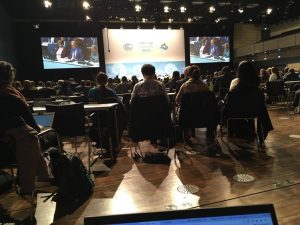In the afternoon of the second day of the COP came some unexpected good news. Syria, the final country to have not joined the Paris Agreement, announced its intent to sign into the accord. When the Paris Agreement was first reached in 2015, only Nicaragua and Syria declined to sign — Nicaragua in protest to the leniency of the agreement and Syria due to a bloody civil war. Nicaragua joined in October, and despite President Trump’s announcement of an intent to withdraw, the United States cannot fully and officially exit until three years after the Agreement entered into force — in other words, November 2020. For now, all recognized countries are essentially signatories to the Agreement, a success which has lifted spirits in the opening week of COP 23.

Delegates deliver opening statements in the APA plenary
Much of the run-up to the COP and the first day and a half was in the shadow of the United States’ stated intent to withdraw, leaving a large gap as both a major funder and polluter. An American pavilion was ostensibly missing from the international pavilions in the Bonn Zone, and the French pavilion challenged Trump directly with its “Make our Planet Great Again” slogan. While delegates from other nations stressed that the Paris Agreement was irreversible and non-negotiable, there was a clear elephant in the room causing a feeling of uncertainty. The addition of Syria does not solve the problem of losing American funding or support, but it does deliver an important emotional victory in the early days of this COP. The mood across the conference is markedly different, and hopefully this update can motivate further action as delegates attempt to hammer out the Paris Agreement’s rulebook before the close of COP 24 next year in Poland.
While the US was already clearly far apart from other countries in its rebuttal of the Paris Agreement, the inclusion of Syria makes it strikingly clear that it is the United States against the world. Other attendees have been generally welcoming of American student and NGO delegations, but there have been many interactions of confusion and surprise that Americans remain present here in Bonn. On Thursday a group of American NGOs and sub-national actors will open a tent promoting the We Are Still In campaign, but as of now few around the conference are aware of such an exhibition. Much more known is the decision of the official United States delegation to host a talk promoting the use of coal, only days after a major Greenpeace protest criticized Germany’s use of brown coal mines. The talk is far apart from all other presentations delivered here in Bonn, as the United States federal government is isolated in its stand against the Paris Agreement.
The shadow of United States withdrawal will continue to hang over this COP, especially from the perspective of being an American student. But the addition of Syria onto the Paris Agreement injected this conference with confidence in its solidarity, and gave tangible evidence towards the continuance of progress. Hopefully this optimism will spill over throughout the COP and lead to a surge in productive action.